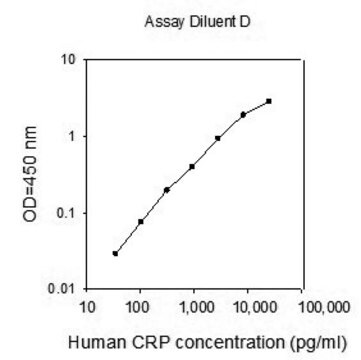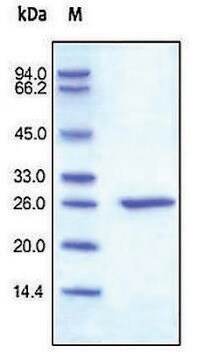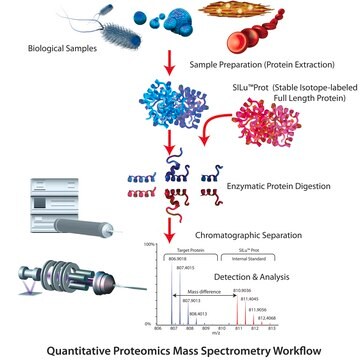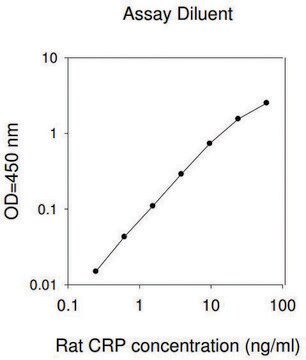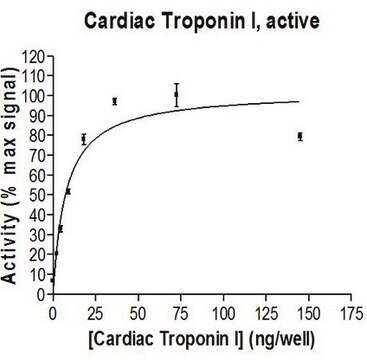AG723-M
C-Reactive Protein
Synonyme(s) :
CRP
Se connecterpour consulter vos tarifs contractuels et ceux de votre entreprise/organisme
About This Item
Code UNSPSC :
12352202
eCl@ss :
32160405
Nomenclature NACRES :
NA.41
Produits recommandés
Source biologique
human
Niveau de qualité
100
300
Essai
>98% (SDS-PAGE)
Forme
liquid
Fabricant/nom de marque
Chemicon®
Concentration
3.5 mg/mL
Numéro d'accès NCBI
Numéro d'accès UniProt
Description générale
C-reactive protein (CRP) is a homopentameric acute-phase inflammatory protein, which belongs to the pentraxin family. It is a highly conserved plasma protein produced mainly in liver hepatocytes. It is also synthesized by lymphocytes, smooth muscle cells, macrophages, endothelial cells, and adipocytes.
Application
C-reactive protein (CRP) has been used:
- as a model analyte for interference-reduced detection of CRP in serum using non-competitive sandwich immunoassay in combination with surface plasmon field-enhanced fluorescence spectroscopy (SPFS)
- to determine the involvement of collectin placenta 1 (CL-P1) in CRP-mediated complement activation and to investigate the downstream effects of this complement activation
- to examine to study the effects of lectin-like oxidized low-density lipoprotein receptor 1 (LOX-1) on CRP-induced complement activation by interacting with CRP to develop an inflammatory pathogenic response
Actions biochimiques/physiologiques
C-reactive protein (CRP) plays a vital role in the complement pathway, apoptosis, phagocytosis, nitric oxide (NO) release. It also regulates the production of interleukin-6 and tumor necrosis factor-α. Patients suffering from appendicitis, cholecystitis, pancreatitis, and meningitis have elevated levels of CRP. CRP facilitates the uptake of low-density lipoprotein in macrophages. It has a crucial role in the pathophysiology of cardiovascular disease, which makes it a useful marker for inflammation and cardiovascular events.
Qualité
No precipitin bands when tested at 2 mg/mL against anti-whole human serum.
Forme physique
Liquid in 100mM NaCl, 10mM Tris-HCl with 0.1% sodium azide, 2mM CaCl2
Stockage et stabilité
Maintain under sterile conditions at 2-8°C for up to one year. Do not freeze. Full safety precautions should be taken as in the handling of any potentially infective body fluid.
Informations légales
CHEMICON is a registered trademark of Merck KGaA, Darmstadt, Germany
Code de la classe de stockage
12 - Non Combustible Liquids
Classe de danger pour l'eau (WGK)
nwg
Point d'éclair (°F)
Not applicable
Point d'éclair (°C)
Not applicable
Certificats d'analyse (COA)
Recherchez un Certificats d'analyse (COA) en saisissant le numéro de lot du produit. Les numéros de lot figurent sur l'étiquette du produit après les mots "Lot" ou "Batch".
Déjà en possession de ce produit ?
Retrouvez la documentation relative aux produits que vous avez récemment achetés dans la Bibliothèque de documents.
Les clients ont également consulté
Lectin-like Oxidized LDL Receptor 1 Is Involved in CRP-Mediated Complement Activation.
Fujita Y, Yamaguchi S, Kakino A, Iwamoto S, Yoshimoto R, Sawamura T.
Clinical Chemistry null
Yoshiko Fujita et al.
Clinical chemistry, 56(3), 478-481 (2010-01-16)
C-reactive protein (CRP) increases in response to inflammation and is purported to be a risk factor for atherogenesis. We recently demonstrated that a scavenger receptor, lectin-like oxidized LDL receptor (LOX-1), is a receptor for CRP. In light of the overlapping
Charles R Kiefer et al.
Clinica chimica acta; international journal of clinical chemistry, 413(19-20), 1536-1541 (2012-06-28)
We evaluated the utility of an independent biomarker of early ischemic cellular damage-circulating fractional forms of C-reactive protein (fracCRP), to verify the diagnostic relevance of low Troponin I (TnI) values within the context of a workup for Acute Coronary Syndrome
Nitai Roy et al.
Biochimica et biophysica acta, 1860(6), 1118-1128 (2016-03-01)
C-reactive protein (CRP) is a plasma pentraxin family protein that is massively induced as part of the innate immune response to infection and tissue injury. CRP and other pentraxin proteins can activate a complement pathway through C1q, collectins, or on
Safaa I Khater et al.
Biomedicines, 10(7) (2022-07-28)
Oxidative stress is considered the main etiologic factor involved in inflammatory bowel disease (IBD). Integration of nanocarriers for natural therapeutic agents with antioxidant and anti-inflammatory potential is a novel promising candidate for curing IBD. Herein, the colonic antioxidant and anti-inflammatory
Notre équipe de scientifiques dispose d'une expérience dans tous les secteurs de la recherche, notamment en sciences de la vie, science des matériaux, synthèse chimique, chromatographie, analyse et dans de nombreux autres domaines..
Contacter notre Service technique
